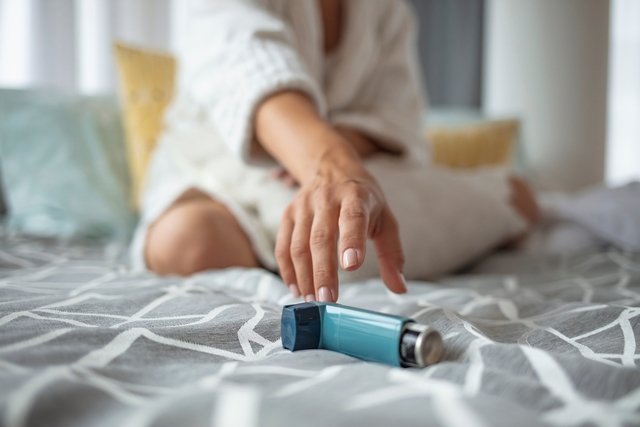To relieve an asthma attack, it is important to remain calm in a comfortable position and to use your inhaler.
If your inhaler is not close by, you should call for medical assistance. Try to keep calm and remain in the same position until your breathing gets under control or until medical assistance arrives.
Asthma attacks can be identified by distinct symptoms like difficulty breathing and purple lips. Some dietary changes can help to prevent frequent attacks.

First aid for asthma attacks
To help someone experiencing an asthma attack, you can:
- Soothe the person and help them get into a comfortable position.
- Ask the person to lean forward slightly, and to rest their elbows on the back of a chair to help them breathe better.
- Check if the person as asthma medication on them, like an inhaler, and offer assistance in preparing it for use.
- Call an ambulance if the person stops breathing or does not have their inhaler close by.
If the person faints and stops breathing, call for help, and start CPR or other life-saving measures until professional help arrives.
What do to if you don’t have an inhaler nearby
In some cases, a rescue inhaler may not be readily available. If you are experiencing an asthma attack and do not have your medication, be sure to remain in the same spot while you wait for medical assistance. This will help to conserve your energy and your reduced oxygen levels to maintain normal organ functioning.
You can also loosen any tight clothing that may be obstructing your breathing. Try to remain calm and breathe slowly, breathing in through your nose and out through your mouth until your doctor arrives.
How to prevent
To prevent asthma attacks, it is important to identify the factors that trigger symptoms and avoid them in your daily routine. Some common asthma triggers include pollution, allergies, cold air, strong odor or smoke.
Some health conditions, like a cold, flu or sinusitis, can also cause more intense symptoms that trigger asthma attacks.
Adhering to your doctors prescribed treatment is essential for managing symptoms and preventing flare-ups. Keeping your rescue inhaler close by is also a good habit, even if it is not always necessary.
What to eat
Asthma attacks can also be prevented through diet by consuming foods that naturally contain anti-inflammatory properties. Learn more about the anti-inflammatory diet and which foods to incorporate into your diet.
